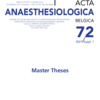Point-of-care coagulation testing in cardiac surgery: an updated narrative review
Whole blood coagulation time’ (Mesh); ‘Cardiac surgical procedures’ (Mesh); ‘Point-of-care testing’ (Mesh)
Published online: Apr 21 2022
Abstract
Objective: To summarize current literature and guidelines on the use of point-of-care coagulation tests (POCCT) in the treatment and prediction of peri-operative bleeding during cardiac surgery and its impact on transfusion rate and patient outcome.
Background: Bleeding complications after cardiac surgery are common and can lead to postoperative anemia and allogeneic blood transfusions (ABT), they often require surgical re-exploration, prolong mechanical ventilation and ICU length of stay, increase health-care costs and can even cause death. Recent guidelines on patient blood management suggest that a timely diagnoses of underlying coagulation abnormalities is of paramount importance with the aim of only administering selectively those blood products or pro-hemostatic components that are actually needed and thereby reducing unnecessary ABT.
Discussion and conclusion: The cause of bleeding in the perioperative period during cardiac surgery is multifactorial. Preoperative antiplatelet or anticoagulant therapy can influence perioperative bleeding. The hemo-static changes induced by cardiopulmonary bypass can result in consumptive coagulopathy and hyperfibrinolysis. Therefore, finding the specific origin of the bleeding and the hemostatic derangement is of paramount importance. Conventional coagulation tests are not equipped to give this information in a timely manner in the setting of an acute bleeding. POCCTs have low predictive value for postoperative bleeding. However, evidence shows that individualized implementation of an algorithm with POCCTs can reduce ABT to the absolute essential, improve patient outcome and reduce health-care costs in the management of bleeding after cardiac surgery.
